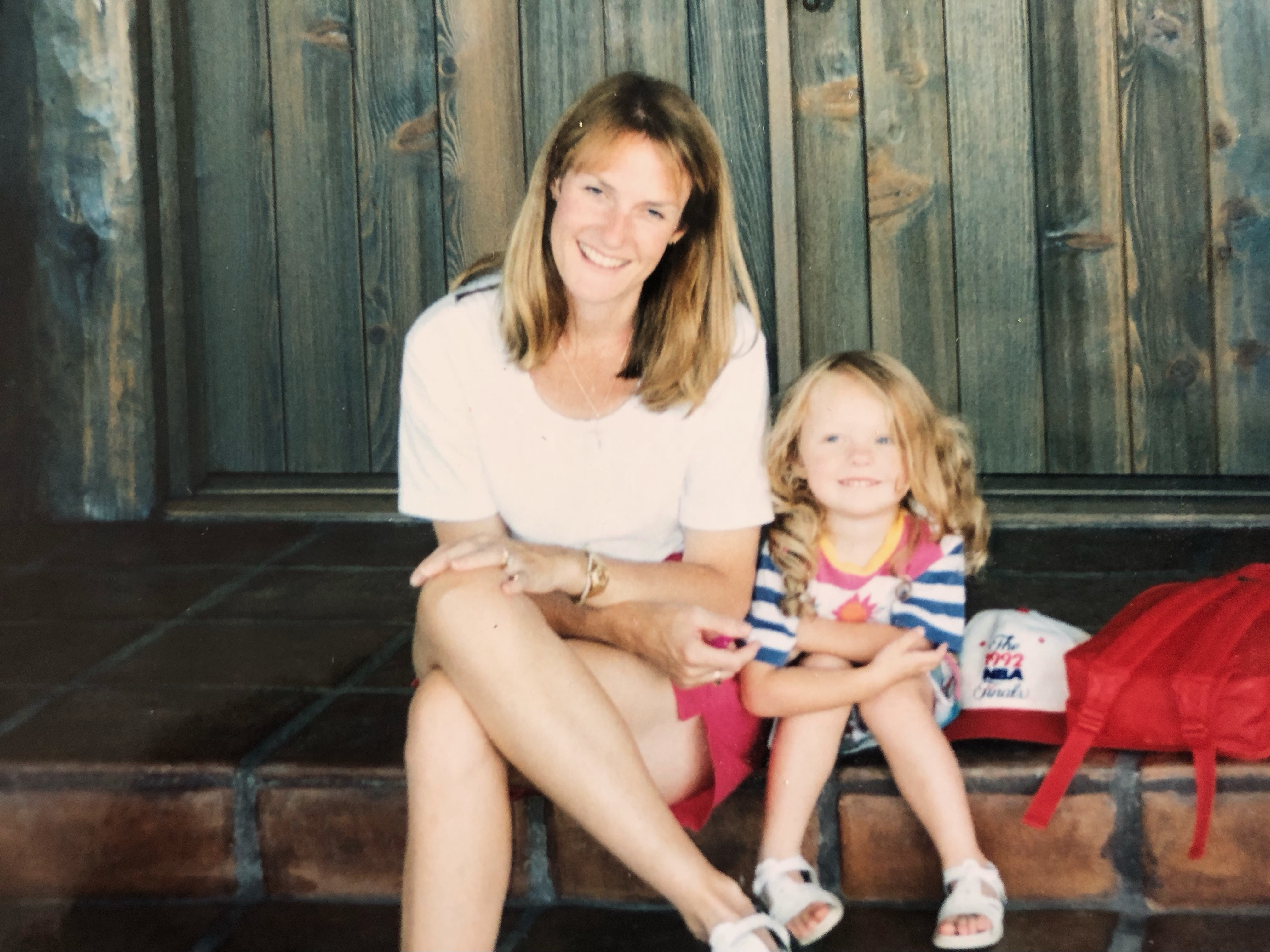
Portland writer Marlena Williams with her mother, Mary Williams. Mary grew up Catholic in a rural part of Canby, Ore. She warned her daughter about the dangers of "The Exorcist," like her mother before her. They both watched it anyway.
Courtesy of Marlena Williams / OPB
The 1973 horror classic “The Exorcist” turns 50 this year. The franchise has seen its fair share of sequels over the decades, including a new movie this October. But one Portland author has more to say on the original.
Marlena Williams’ new book “Night Mother” is a personal and cultural history of the film. In it she interweaves a collection of critiques and essays, unpacking what the movie has to say about girlhood, faith and grief. But she also delves into how the movie has affected her own life: Her Catholic mother warned about the dangers of the film, and her mother before her. They both watched it anyway.
Williams also explores her own grief after losing her mother to cancer, and how the heart of “The Exorcist” is about the strong bond between mother and daughter. Her new book is out Oct. 20. She spoke about it with OPB host Donald Orr — listen in, or read an edited transcript of their conversation below.
Donald Orr: So briefly for the unfamiliar, what is “The Exorcist” about, and what drew you to the movie in the first place? What made you an expert on “The Exorcist”?
Marlena Williams: Very broadly, the movie is about the possession of a young girl, Regan MacNeil, living with her single mom, an actress in Georgetown, Washington D.C. in the early ‘70s. It’s also about the two priests that eventually come to the home and remove the demon from her body.
My interest in the movie really stems from my mom who saw “The Exorcist” in 1973 when it first premiered. It really terrified and traumatized her to the point where 20 years later when she had me, she was telling me about the movie and banning me from ever seeing the movie.
Growing up Catholic, that was something that was a terrifying concept to me. So, just hearing her tell me about it scared me. I happened to see a little clip from the movie just accidentally ... had nightmares, couldn’t sleep. It messed me up just like it messed her up, just from seeing a little clip of it.
When I was 18, my mom died. And I finally decided to revisit the full film, kind of in an attempt to understand why it had terrified her so much and why it had made such an impact on her to the point where she was warning her young little girl not to see it.

Despite sub-freezing temperatures and rain, a crowd waits in line outside the Paramount Theater in New York City, Feb. 4, 1974, for a showing of "The Exorcist."
RON FREHM / AP
Orr: So what was it like in 1973 when this movie first came out? What were the general reactions?
Williams: So “The Exorcist” premiered I think almost one year to the day after Roe v. Wade was decided. The Vietnam War was spiraling at the time; I think the Watergate hearings were happening. The Catholic church had actually issued a proclamation saying that evil is a real and living entity that’s afoot in this world. So in a way, our culture was really primed for a movie about a devil returning to Earth. And it was also just at a time where there was a lot of debate about women’s role in society after the passage of Roe v. Wade. I think the Equal Rights Amendment was just introduced.
Thinking about parallels between 1973, when the original premiered, and then 50 years later, in a way, we’re living in a very similar cultural moment. It’s been over a year now since Roe v. Wade was overturned. I also think we’re living in a time where there’s a lot of concern about our youth. There’s a conservative impulse motivating that too — a concern about what we’re teaching our kids in schools. Some conservative, in my opinion, hysteria about gender-affirming care that in a way, I think, is pretty similar to some of the fears about youth that were happening in the early ‘70s.
Orr: You acknowledge that level of terror and the movie’s importance in the horror canon. But in the book you also don’t pull any punches. What shortfalls does the film present around girlhood and womanhood, and general American fears?
Williams: I love the movie. I’m its biggest fan, but there’s also a lot of troubling things about the movie. It’s about a young, young girl on the brink of puberty who becomes possessed. And it’s very influenced by kind of a cultural fear of a young maturing girl who’s leaving behind girlhood and becoming a woman.
There’s a very famous scene in the movie where the young girl is stabbing herself repeatedly with a crucifix. I think that just reflects the movie’s fear of like women’s sexuality, fear of young women; the male fears around a maturing woman.
Orr: You mentioned growing up Catholic. How did your upbringing inform your relationship with the movie and your relationship with your mom?
Williams: My mom in 1973, seeing “The Exorcist” in a small town, also with a very Catholic mother — it preyed on a lot of fears for her. And I think in Portland in the early ‘90s when I was growing up, my mom wasn’t quite as devout as her mom. But still, I went to Catholic school from kindergarten until senior year in high school. As a kid at least, I believed the devil was a real thing. This idea that the devil could come inside of me and take control of my body and turn me into a monster was just the most terrifying concept I could think of.
Orr: You offer a lot of insight and critique in the book about the movie and the behind the scenes stuff. But you also interweave such a beautiful remembrance of your mom, and your own reflections on grief and coming to terms with that. How did you process all of that through the lens of this movie?

Marlena Williams with her mother, Mary Williams. Marlena lost her mom to cancer when she was 18 years old. Marlena processes the loss of her mom through the lens of "The Exorcist" and growing up Catholic in Portland.
Courtesy of Marlena Williams
Williams: As a culture, I feel like we understand that “The Exorcist” is about a possessed little girl. But then when I finally saw the movie, I saw that it is about a mother and a daughter. The mom played by Ellen Burstyn, a single mom caring for her daughter. It ends on this note of a mother and a daughter holding each other in a corner. And I thought that was a really moving image in a part of the film that we don’t really hear about.
Both the director William Friedkin and the screenwriter [and author of the novel] William Peter Blatty had lost their mothers shortly before they started filming “The Exorcist.” And so I do think the movie is about the loss of a mother.
Watching the movie with all that in mind and then working through it in the book really did actually help me with the grieving process. It also helped me — diving down into my mother’s life, trying to understand her better in terms of like, kind of turning into a character — that was also a really great way to deepen my relationship with her, even though she’s no longer here.



